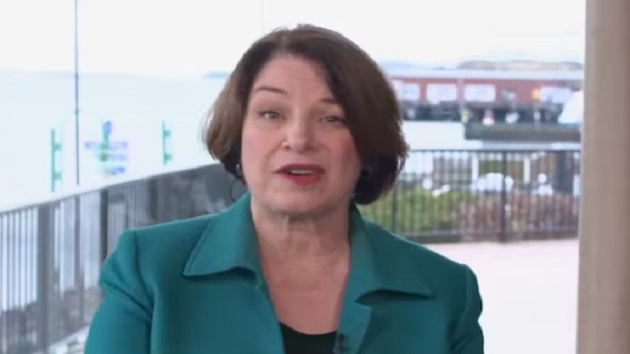McCarthy defends debt ceiling deal, predicts Democrats will join GOP in passing it to avert default
Written by ABC Audio All Rights Reserved on May 28, 2023

(WASHINGTON) — A bipartisan majority of Congress will approve a compromise in the coming days to raise the nation’s debt ceiling and avert a historic default that could upend the economy while enforcing some limits on government spending, House Speaker Kevin McCarthy predicted on Sunday.
McCarthy, flanked by the two Republican negotiators who worked with him on brokering a debt and spending deal with the White House, spoke with reporters outside his office on Capitol Hill on Sunday.
He offered some specifics about the agreement with President Joe Biden while pushing back on already-emerging criticism from his party’s right flank that Republicans did not exact enough concessions on the federal government’s budget.
“I think people will look back and say, ‘Well I didn’t get exactly what I wanted.’ But there’s something in here that — it shouldn’t be about you, it should be about America,” McCarthy said. “America believes that we have spent too much, so this spends less.”
The bill “doesn’t get everything everybody wanted,” he acknowledged, “but that’s, in divided government, that’s what we end up with.”
McCarthy said he would speak with Biden again later Sunday, to review the finalized language of the legislation, and then the text will be posted publicly, starting a 72-hour countdown that he has committed to members for reading the bill before a vote on Wednesday. The proposal would be about 150 pages or less, he said.
“This is a good, strong bill that a majority of Republicans will vote for,” he told ABC News’ Trish Turner.
And with Biden’s backing, “I expect his party to be supportive as well,” McCarthy said.
While he and Reps. Garret Graves and Patrick McHenry, of Louisiana and North Carolina, deferred some details of the debt bill to the final text, they touted what they saw as major wins.
“This is the most conservative spending package in my service in Congress,” McHenry, a 10-term representative, said.
McCarthy again stressed that Republicans had forced Biden to reverse his monthslong insistence that the White House would only negotiate on the budget separate from any increase on the debt, with Democrats likening talks with Republicans under the threat of default to economic hostage-taking.
“It wasn’t until the final two weeks that we were really able to sit down,” McCarthy said.
The clock was ticking the whole time: Treasury Secretary Janet Yellen has said the federal government will run out of money to pay all of its bills as soon as June 5 unless its $31.4 trillion borrowing limit is raised.
Such a default would undermine the credit of the U.S., which is a lynchpin of the international economy, and could delay payments on a swath of services including Social Security.
On Sunday, the speaker repeatedly praised both Graves and McHenry and Biden’s team of “professional,” “smart” and “tough” negotiators.
“The negotiations were intense, they were quite challenging,” McHenry told reporters. “The outcome of that is a fundamental shift in the spending trajectory in Washington.”
ABC News has previously reported that, according to sources familiar, the agreement is a two-year budget deal that would also separately raise the debt limit for two years while keeping non-defense spending roughly flat with current levels in fiscal year 2024 and increasing by 1% in 2025.
The agreement would phase in new work requirements for recipients of Supplemental Nutrition Assistance Program (SNAP) benefits — specifically time limits on the benefits for people up to age 54, excluding veterans and homeless people. Those new requirements would sunset in 2030, sources said.
The bill would fully fund medical care for veterans, including an extension of funding in the PACT Act, one source said.
And the deal would streamline the review process for certain energy projects.
McCarthy, Graves and McHenry on Sunday pointed to changes to the National Environmental Policy Act, in particular, and said that while government spending on defense and veterans would increase under the deal, other appropriations would fall below the 2022 level.
McHenry highlighted “consequential” changes to SNAP, also known as food stamps, and fixing “loopholes” in TANF, or Temporary Assistance for Needy Families, but he demurred on further details until the bill text was published.
Ultimately, McCarthy and his negotiators said, Republicans could not enforce a more sweeping, 10-year spending reduction into the next Congress because future lawmakers would simply be able to vote to undue it.
McHenry said that the bill instead lays out, as one example, $704 billion in annual non-defense discretionary government spending while “hold[ing] vets harmless” — a rebuke of Democratic criticism that Republicans were seeking spending cuts that could affect veterans.
Graves said their legislation includes six years of spending caps, with different means of enforcing the first two years, under the current Republican House majority, than the remaining four.
The speaker was pressed several times by reporters on comments by some House Republicans that the debt deal doesn’t go far enough, especially in light of the Limit, Save, Grow Act that was passed along party lines in the House last month.
“This ‘deal’ is insanity. … Not gonna vote to bankrupt our country. The American people deserve better,” Rep. Ralph Norman, R-S.C., tweeted.
Sen. Rand Paul, R-Ky., likewise shared his displeasure on social media. “Conservatives have been sold out once again!” he tweeted.
McCarthy played down reports of in-fighting, insisting more than 95% of his conference had been “overwhelmingly excited” about the compromise during an earlier conference call.
“Let’s let the members actually read the bill before they make a decision and go forward,” he told reporters.
He also brushed off the potential risk of a snap vote to boot him from the speakership, which any single member could trigger under an earlier deal McCarthy made to win the gavel in January.
“Not at all,” he said when asked if he was worried about such a move, known as a motion to vacate.
The GOP holds only a narrow majority in the House right now. Passing a debt compromise theoretically would require at least a bare majority of Republicans — with enough Democrats to make up for any conservative defections.
In a “dear colleague” letter shared Sunday morning, House Minority Leader Hakeem Jeffries told Democrats that the Biden administration would brief them later in the day on the terms of the deal.
Jeffries made no commitments about the scope of his caucus’ support but struck an optimistic tone on raising the borrowing limit: “I am thankful to President Biden for his leadership in averting a devastating default and look forward to our collective discussion,” he wrote.
Senior White House officials immediately started calling a number of House Democrats to sell them on the deal, multiple lawmakers who have received the calls told ABC News. Aides to moderate Democrats are hoping for a “hard sell” from the administration.
Talking points circulated by the White House to members of Congress, and obtained by ABC News, encouraged lawmakers to focus on what the deal between Biden and McCarthy doesn’t do, including further government cuts and changes to social programs.
Among Republicans, sources told ABC News on Sunday that the whip operation was well underway as well and a small group of members have returned early to Washington, reaching out to as many lawmakers as possible.
But House GOP leadership sources acknowledged that passing the deal will likely come down to moderate Democratic votes — at the same time that the more Democrats that support the agreement, the more that may complicate things for Republican members, sources said.
McCarthy told reporters on Sunday that he has spoken to Jeffries multiple times and spoke with Senate Minority Leader Mitch McConnell on Saturday. He plans to speak with the GOP’s Senate conference later Sunday to explain the agreement, he said.
The speaker first announced a deal in principle on Saturday night, after weeks of talks with Democrats and a seesawing tone from both sides on the ultimate fate of any agreement.
In a brief statement Saturday, Biden said their compromise was “an important step forward that reduces spending while protecting critical programs for working people and growing the economy for everyone.”
“I strongly urge both chambers to pass the agreement right away,” the president said.
ABC News’ Katherine Faulders, Jay O’Brien, Lauren Peller, Elizabeth Schulze, Rachel Scott, Benjamin Siegel and Will Steakin contributed to this report.
Copyright © 2023, ABC Audio. All rights reserved.






